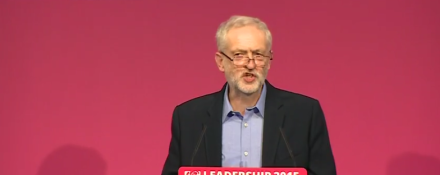
“There’s nothing half-hearted about anything I do!” The line that won Jeremy Corbyn the biggest round of applause this morning was not in his speech at all, but came after a third journalist asked him if he really was all that committed to campaigning for the EU. It embodied plenty of what the Labour grassroots like about the leader: a nod to authenticity, a slight frustration with the media, and a head-on contradiction of the prevailing narrative.
While the reports of this morning’s intervention in the referendum debate will focus on the caveats contained in Corbyn’s endorsement, the biggest cut-through to the public consciousness will be that he is backing a vote to Remain. Most members of the public would find it astonishing that Corbyn is under scrutiny for his late entrance into a debate they will not have realised has even begun.
If – and it’s a big if – the news of his scepticism does get wider attention, it will probably do the In campaign no harm. Corbyn has, by chance more than anything, caught the public tone, if not the detail, of the debate. He embodies the sceptical, begrudging support for the EU that many feel – even if his criticisms of the European Union are remarkably different.
There were what appeared to be knowing nods to Corbyn’s feelings scattered throughout. During his introduction, head of the Labour In campaign Alan Johnson noted the “remarkable” level of “unity in Labour’s ranks” over the EU – and barely concealed a smirk when he described the veteran republican Corbyn as “leader of Her Majesty Most Loyal Opposition”.
Rising to the occasion, Corbyn himself ad-libbed a line about the Senate House setting for the speech having provided the inspiration for Orwell’s Ministry of Truth. “We shall see,” he added, in a tone that may as well come with a vaudevillian wink.
This approach, by publicly appreciating that he is not starry-eyed when he gazes upon the EU flag, could do even more to help his current standing as the most trusted major politician on the issue, as a new poll revealed today. His speech felt more nuanced than forced, and was classically Corbyn in style: rather than sticking to one topic, he took a meandering tour through various subjects. The steel crisis, tax avoidance, the NHS, climate change, the Tories – all were reasons for reforming the EU, even if it was not clear what the reforms needed were.
Migration was one of the many issues touched upon, and Corbyn appreciated that it would be the main focus of the debate around EU membership. But his concern lay solely with the exploitation of migrant workers, and in the Q&A that followed refused to accept that the rise in immigration was a factor in the problem.
That seems evidence of his feelings towards the voters he is trying to attract. More and more, it is believed that Labour supporters (note: not members) are the key swing demographic in winning June’s referendum. Corbyn is aware of the problems that faced Scottish Labour after 2014’s independence referendum, and his determination to only engage with a Labour In campaign, not sharing a platform with David Cameron, is his way of avoiding that same fate.
His announcement that the speech today was the “socialist case” for staying in was also an indication of what he thinks Labour supporters are like. When he addressed Scottish Labour Conference back in November, it seemed his strategy to appealing to lapsed traditional Labour voters was to pepper his speech with the word “socialist” and evoke the spirit of Keir Hardie.
Winning back those voters in Scotland will not be that simple – and convincing Labour supporters to vote In may not be either.




More from LabourList
Reeves bets on patience over populism
‘Energy efficiency changes must work for older private renters’
‘Labour’s creative destruction dilemma’